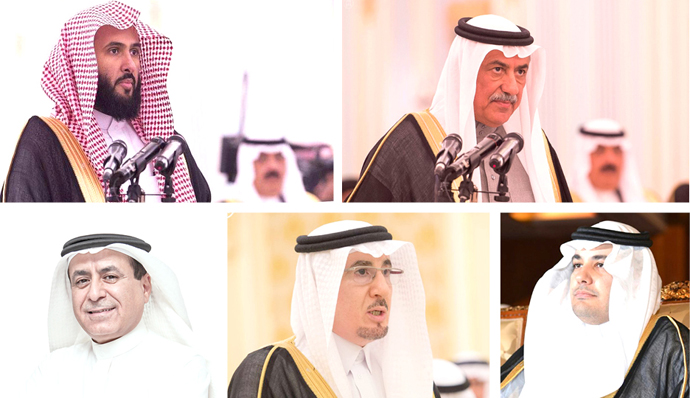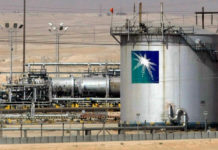”Ministers of finance, justice, information and labour visions” regarding governance
Twenty-four governmental entities have been working on national transition programme to face challenges hindering each governmental sector. One of the significant duties of the ministry of finance is establishing a state financial centre and controlling national debt to 30 per cent of GDP, which is considered less than the international average.
Dr. Ibrahim El-Assaf Saudi Arabia’s Minister of Finance, has declared an interview about launching the Saudi national transition programme 2020 originating from “Saudi Arabia Kingdom Vision of 2030”, that percentage of national debt to gross domestic product, currently has increased from 7% to 30% in 2020. This percentage is not an objective of the programme plan. Instead, it is an expected number resulting from costs and revenues. He added, Saudi Arabia is open to float international bonds but the size of these bonds is not yet decided.
We aim at reasoning the national debt as to make it possible for the kingdom to pay on time and as fits, El-Assaf added. He said, during his comment on the ministry role in the national transition programme 2020, that the programme application will take the national economy to a new stage of growth and stability, in addition to other factors such as: Public investments, Aramco projects, privatisation and international partnerships.
El-Assaf talked about the importance of financial stability in any economy to achieve financial balance and stability in general in financial matters or currency prices and inflation. He explained that all these matters are main factors of high significance to the ministry of finance.
The strategic objectives of the ministry of finance are mainly related to enhancing non-oil revenues and financial and technological governance, El-Assaf said. He continued, taking care of the state capitals in general, making sure they are under control and finally being aware of them, as not to be disordered, are as well objectives of the ministry.
The ministry started its work already through finance unit, public finance and national debts unit, along with researching these elements with international entities.
Dr. Waleed El-Samaani, minister of justice, refers to the national transitional programme as one of the executive programmes established to achieve “Kingdom vision”; the vision is based on a deliberate method to highlight all challenges facing government entities in economic and development sectors, it also has set the needed objectives to face such challenges. The programme method sets a different example of executive and governmental work as it is based on flexibility and effectiveness, he explained.
El-Samaani indicates the participation of the ministry of justice in executing the national transition programme through defining challenges facing the ministry and observing the most significant strategic objectives to overcome these challenges; a number of needed initiatives are set to overcome such challenges afterwards, along with seven strategic objectives.
The main strategic objectives of the ministry of justice are: delivering better judicial service, increasing corporate efficiency, eliminating the flow of conflicts and cases into courts, increasing the kingdom judicial system credibility rate and highlighting its national and international roles, El-Samaani added. He continued that improving notarisation performance, enhancing retail security and finally enabling judiciary role in conciliation and finding alternative means to resolve conflicts, are as well among the main objectives.
Dr. Adel El-Tarifi, minister of culture and information, views the announcement of the national transitional programme as an evident of Council of Economic and Development Affairs commitment. This programme is challenging all government entities to deliver better service and face challenges, especially those related to citizens’ services.
El-Tarifi said that the ministry of culture and information has set five main objectives as part of the national transition programme 2020. The most significant objectives are enhancing national and cultural identities, providing the appropriate work environment for cultural activities and enhancing them, supporting media industry, as it is one of the important elements in the kingdom media work. The main focus is on establishing a media city and a media production city to increase media work level and national content in the kingdom, he pointed out.
El-Tarifi stresses on the great goal of main concern in the ministry of culture and information, which is improving the public image of Saudi Arabia Kingdom, internally and externally as this is one of the most important concerns to the ministry as a consequence of the negative images and false accusations against the kingdom, especially in the last two decades. These accusations are false and a result of misunderstanding of our culture and true image.
El-Tarifi highlighted that the ministry of culture and information has eight initiatives included in the national transition programme to ensure working according to KPIs in a supervisory groups system to measure performance in 2017 and the next five years and to guarantee the ministry strategic objectives success in both cultural and media domains.
Dr. Mafrag El-Hakbani, minister of labour and social development, has asserted that the national transitional programme is considered as an important phase in the government path; the programme methodology is competent and has many development initiatives. Moreover, it is important to highlight the strategic linkage of the programme.
The ministry of labour and social development focused on supporting the needy groups and creating protection network for all benefiters and family protection services as the kingdom participates in different international organisations and gives a great significance to this regard, he added.
El-Hakbani referred to the number of immigrants estimated at 9 million employees coming to work in the private sector. He expresses his hopes that this percentage will decrease unemployment rate; as well as establishing new projects and increasing women participation, in accordance with Islamic laws.
Suliman El-Hamdan, minister of transportation, has asserted that the national transition 2020 serves as a turnaround in the concept of governmental administration and an exceptional work at the level of the kingdom and surrounding countries. The best way of improving the concept of governmental administration lies within main participation with different governmental entities.
Suliman El-Hamdan says the “transition” is part of other executive programmes confronting with “2030 vision”. Each programme focuses on a certain domain, explaining that the programme is an important step towards achieving strategic objectives within clear performance measure. This is possible through conducting monthly and quarterly interviews; this is what we call modern management concepts. He pointed out, the national transition programme has just started and it should be given more time to execute it properly. Ministry of transportation is a critical factor of development and executive programmes that carry the kingdom’s vision. It also plays a significant role of supporting initiatives, strategic objectives and delivering services to many ministries.
El-Hamdan highlighted, there are four main entities working under the system of ministry of transportation: airline transport, marine transport, railroads and public transport.
The first strategic objective of the ministry of transport, in accordance with national transition programme 2020, is making the kingdom an exceptional global logistics centre, benefiting from its geographical location among three continents, Asia, Africa and Europe. In addition, ports are of high importance as 30 per cent of world trade comes across the red sea, El-Hamdan said.















